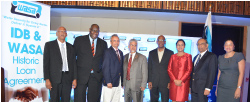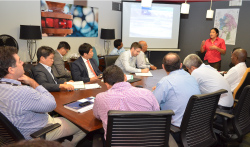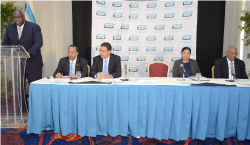WASA Set to Begin IDB Funded Wastewater Rehabilitation Projects

IDB & WASA Loan - L-R, Director Programmes and Change Management (WASA), Ramchand Ramcharan; WASA’s CEO, Gerard Yorke; Minister of the Environment and Water Resources, Senator the Honourable Gange Singh; Minister of Planning and Sustainable Development, Dr. The Honourable, Senator, Bhoendradatt Tewarie; IDB Senior Water and Sanitation Specialist, Evan Cayetano; Minister of State in the Ministry of the Environment and Water Resources, The Honourable Ramona Ramdial; former WASA Board Commissioner, Shiraz Murf Rajab; and Head, Wastewater Projects (WASA), Denise Lee-Sing Pereira; at a ceremony marking the signing of loan agreement for funding of WASA’s Multi-Phase Wastewater Rehabilitation Programme, at the Hyatt Regency Hotel, Port-of-Spain, on February 25th 2013
On September 1 the Water and Sewerage Authority (WASA) entered its 50th year as the organisation charged with the responsibility for providing water and wastewater services in Trinidad and Tobago. As we continue our look at developments in WASA and the water sector, today we focus on the wastewater side of the Authority’s operations, in particular rehabilitation and upgrade of its wastewater treatment and collection infrastructure.
The demand for clean awater and adequate sanitation services is rapidly increasing, and it is estimated that 1.8 million people worldwide die each year from diarrheal diseases – 90 percent of them being children under five. This points to the importance of wastewater treatment and discharge in relation to public health, as improperly treated wastewater can contaminate our water sources and the environment, resulting in devastating effects.
The Millennium Development Goals formulated by the United Nations is dedicated to the reduction of poverty and ensuring sustainable development. Goal number seven intends to “halve by 2015, the proportion of people without sustainable access to safe water and basic sanitation.” As signatory to the implementation of these goals, the TT Government sought funding from the Inter-American Development Bank (IDB) and was able to secure a loan of US $579M for a Multi-Phase Wastewater Rehabilitation Programme over an eight year period toward achieving the goal of “safe water and basic sanitation” – the largest ever provided by the bank in this hemisphere and the largest investment in the wastewater sector since the Lock Joint Project back in the 1960’s.
At a press conference on September 10, at the Radisson Hotel, Port of Spain, the Authority revealed that as part of its mandate to safeguard the health of the public and to enhance the condition of the environment, plans are underway to begin the Multi-Phase Wastewater Rehabilitation Programme, which will reduce the release of improperly treated wastewater effluent in specific catchment areas throughout the country, and to strengthen the Authority's internal operations.

Head, Wastewater Projects, Denise Lee Sing Pereira, addresses potential contractors for projects in the San Fernando and Malabar catchments, at a Pre-bid meeting held at the Authority’s Trincity Regional Centre in October 2013.
The Multi-Phase Wastewater Rehabilitation Programme will be divided into three phases. The first will see the construction of wastewater treatment plants (WWTP) and associated collection systems in the San Fernando and Malabar catchments. The second phase will focus on the expansion and integration of the current sewerage networks into the new WWTPs. The final phase will expand the wastewater collection system to incorporate all remaining properties in the targeted catchment areas that are still utilising individual on-lot (sceptic tanks and pit latrines) systems.
Funding for the first phase of the programme – Loan No. 2890/OC-TT in the amount of US $246.5M has already been released to the Water and Sewerage Authority (WASA), which will oversee the works. In this regard, letters of award have been issued to Sinohydro Corporation Limited, for construction of the Malabar Wastewater Treatment Plant and Collection System, at a total cost of $620,194,021.00; and Acciona Agua S.A.U. and Atlatec S.A. de C.V. (Joint Venture), for construction of the San Fernando Wastewater Treatment Plant and Collection System, at a total cost of $654,053,426.17.

WASA CEO, Gerard Yorke, addresses members of the media during a media conference held at the Radisson Hotel, Port of Spain, on Wednesday 10th Sept.; other members of the WASA team at the head table include L-R: Director Customer Care, Doodnath Bhola; Head, Strategic Planning and Investment, Alan Poon King; Head, Wastewater Projects, Denise Lee Sing Pereira; and Director Programmes and Change Management, Ramchand Ramcharan.
How are these funds being allocated? The procurement process for these contracts followed the IDB’s standard policies and procedure every step of the way, and required the IDB’s Non - Objection, as well as the approval of WASA's Board of Commissioners.
WASA has also secured a second IDB loan – No. 2600/OC-TT in the sum of US$50M, which will cover the cost of another wastewater developmental project - the Wastewater Infrastructure Rehabilitation Programme in the Maloney catchment. Similarly, this project will seek to enhance the quality of effluent discharged, through the rehabilitation and expansion of the existing Maloney WWTP, as well as expansion and integration of the collection system.
At the end of both projects, WASA expects that all homes, commercial and government institutions that fall within the catchments will have access to its centralised wastewater collection and treatment system. The Authority also expects the projects will go a long way toward protecting public health and the environment, as overall centralised sewer coverage is set to increase from the current 30 percent to 45 percent.